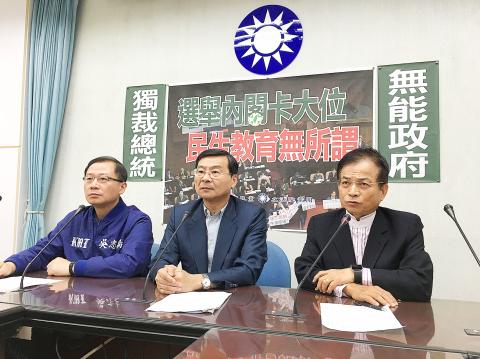The Chinese Nationalist Party (KMT) yesterday said that the latest Cabinet reshuffle was creating an “election Cabinet,” showing that the Democratic Progressive Party (DPP) is more concerned with staying in power than protecting the public’s rights.
Appointing Executive Yuan spokesman Hsu Kuo-yung (徐國勇) as Minister of the Interior shows that the DPP is solely concerned with candidates’ political correctness, rather than their capabilities, KMT Culture and Communications Committee deputy director-general Hung Meng-kai (洪孟楷) said.
Reappointing Minister of the Interior Yeh Jiunn-rong (葉俊榮) as minister of education after a month-long vacancy shows that academics were reluctant to accept the position following the DPP government’s handling of the “Kuan Chung-ming (管中閔) incident,” Hung said.

Photo: Lin Liang-sheng, Taipei Times
The government has refused to confirm Kuan as National Taiwan University (NTU) president after his election by committee on Jan. 5 and in April said it would not appoint him, as he faced allegations that he failed to report a potential conflict of interest and of possible academic misconduct, including illegally teaching at Xiamen University in China.
Yeh is also accused of illegally having taught in China, so appointing him as education minister would only cause further controversy, Hung said.
Yeh was in April accused of having broken the law by teaching at Zhejiang University’s Guanhua Law School from Dec.19, 2011, to Jan. 15, 2012, while he was a professor at NTU.
He has denied the allegations, saying that he was not paid for the lectures in China.
While the unpopularity of Minister of Transportation and Communications Hochen Tan (賀陳旦) merited his dismissal, replacing him with Taiwan International Ports Corp chairman Wu Hong-mo (吳宏謀) — who is said to be part of Presidential Office Secretary-General Chen Chu’s (陳菊) clique — is an obvious political plum, Hung said.
The politically-inspired appointments on the heel of the Legislative Yuan’s extraordinary session were made with the year-end elections in mind, but such blatant “redirection” of resources is a double-edged sword that could turn the public against the DPP, Hung said.
A Cabinet reshuffle was to be expected, as there had not been a major one since Premier William Lai (賴清德) was appointed to the position in September last year, KMT legislative caucus secretary-general William Tseng (曾銘宗) said.
However, an election-oriented Cabinet is not in the nation’s long-term interest, as elections are held every four years, he said.
Yeh’s performance as interior minister was adequate, but he is not a suitable appointment as minister of education, Tseng added.
Hsu’s appointment as Minister of the Interior was politically motivated, Tseng said, adding that Hsu’s public image has been tarnished by his attempts to obfuscate information and tendency to argue, rather than communicate, during his tenure as Executive Yuan spokesman.
New Power Party (NPP) caucus convener Hsu Yung-ming (徐永明) said he hopes that the Cabinet reshuffle was not entirely politically motivated and was somehow meant to strengthen ongoing reforms.
“We hope the new ministers will address expectations on sports reform, protection of rights for police and firefighters, renewed efforts to introduce judicial reforms and financial reforms,” Hsu said.
People First Party caucus whip Lee Hung-chun (李鴻鈞) said that the DPP should appoint individuals with the national interest in mind.
The national interest, not party interest, should be of primary concern when planning Cabinet reshuffles, Lee said.
Additional reporting by CNA

‘DENIAL DEFENSE’: The US would increase its military presence with uncrewed ships, and submarines, while boosting defense in the Indo-Pacific, a Pete Hegseth memo said The US is reorienting its military strategy to focus primarily on deterring a potential Chinese invasion of Taiwan, a memo signed by US Secretary of Defense Pete Hegseth showed. The memo also called on Taiwan to increase its defense spending. The document, known as the “Interim National Defense Strategic Guidance,” was distributed this month and detailed the national defense plans of US President Donald Trump’s administration, an article in the Washington Post said on Saturday. It outlines how the US can prepare for a potential war with China and defend itself from threats in the “near abroad,” including Greenland and the Panama

A wild live dugong was found in Taiwan for the first time in 88 years, after it was accidentally caught by a fisher’s net on Tuesday in Yilan County’s Fenniaolin (粉鳥林). This is the first sighting of the species in Taiwan since 1937, having already been considered “extinct” in the country and considered as “vulnerable” by the International Union for Conservation of Nature. A fisher surnamed Chen (陳) went to Fenniaolin to collect the fish in his netting, but instead caught a 3m long, 500kg dugong. The fisher released the animal back into the wild, not realizing it was an endangered species at

The High Prosecutors’ Office yesterday withdrew an appeal against the acquittal of a former bank manager 22 years after his death, marking Taiwan’s first instance of prosecutors rendering posthumous justice to a wrongfully convicted defendant. Chu Ching-en (諸慶恩) — formerly a manager at the Taipei branch of BNP Paribas — was in 1999 accused by Weng Mao-chung (翁茂鍾), then-president of Chia Her Industrial Co, of forging a request for a fixed deposit of US$10 million by I-Hwa Industrial Co, a subsidiary of Chia Her, which was used as collateral. Chu was ruled not guilty in the first trial, but was found guilty

The Chinese Nationalist Party (KMT) is maintaining close ties with Beijing, the Democratic Progressive Party (DPP) said yesterday, hours after a new round of Chinese military drills in the Taiwan Strait began. Political parties in a democracy have a responsibility to be loyal to the nation and defend its sovereignty, DPP spokesman Justin Wu (吳崢) told a news conference in Taipei. His comments came hours after Beijing announced via Chinese state media that the Chinese People’s Liberation Army’s Eastern Theater Command was holding large-scale drills simulating a multi-pronged attack on Taiwan. Contrary to the KMT’s claims that it is staunchly anti-communist, KMT Deputy